|
|
|
Sort Order |
|
|
|
Items / Page
|
|
|
|
|
|
|
| Srl | Item |
| 1 |
ID:
066736
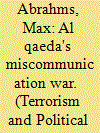

|
|
|
| 2 |
ID:
072125
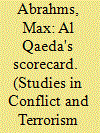

|
|
|
|
|
| Publication |
2006.
|
| Summary/Abstract |
Terrorism scholars are divided over whether terrorism is an effective tactic. Disagreement derives from the fact that the objectives of terrorist groups are often highly contested. Nowhere is this clearer than in contemporary statements on Al Qaeda. This article explores the most common interpretations for why Al Qaeda attacked the United States on 11 September 2001, and then analyzes their empirical support. After determining the most compelling interpretation of Al Qaeda's objectives, the article evaluates Al Qaeda's success in achieving them since perpetrating this watershed attack. The following analysis provides a timely case study in the classic debate over whether terrorism is strategically rational behavior.
|
|
|
|
|
|
|
|
|
|
|
|
|
|
|
|
| 3 |
ID:
052231
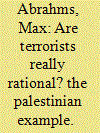

|
|
|
| 4 |
ID:
126477
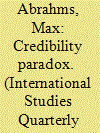

|
|
|
|
|
| Publication |
2013.
|
| Summary/Abstract |
Implicit in the rationalist literature on bargaining over the last half-century is the political utility of violence. Given our anarchical international system populated with egoistic actors, violence is thought to promote concessions by lending credibility to their threats. From the vantage of bargaining theory, then, empirical research on terrorism poses a puzzle. For nonstate actors, terrorism signals a credible threat in comparison with less extreme tactical alternatives. In recent years, however, a spate of studies across disciplines and methodologies has nonetheless found that neither escalating to terrorism nor with terrorism encourages government concessions. In fact, perpetrating terrorist acts reportedly lowers the likelihood of government compliance, particularly as the civilian casualties rise. The apparent tendency for this extreme form of violence to impede concessions challenges the external validity of bargaining theory, as traditionally understood. In this study, I propose and test an important psychological refinement to the standard rationalist narrative. Via an experiment on a national sample of adults, I find evidence of a newfound cognitive heuristic undermining the coercive logic of escalation enshrined in bargaining theory. Due to this oversight, mainstream bargaining theory overestimates the political utility of violence, particularly as an instrument of coercion.
|
|
|
|
|
|
|
|
|
|
|
|
|
|
|
|
| 5 |
ID:
173812
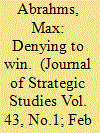

|
|
|
|
|
| Summary/Abstract |
Terrorism carries high audience costs for militant leaders because the attacks on civilians risk tarnishing the entire group as immoral extremists. Image-savvy militant leaders reduce the reputational fallout to the group whenever members commit terrorism. Specifically, the leaders distance their organization from civilian attacks by denying them. In this paper, I identify two types of denial strategies regularly employed by militant leaders, their effectiveness for image restoration, and how Islamic State paid a price for failing to employ them.
|
|
|
|
|
|
|
|
|
|
|
|
|
|
|
|
| 6 |
ID:
144929
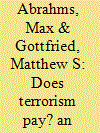

|
|
|
|
|
| Summary/Abstract |
Does terrorism help perpetrators to achieve their demands? Few research questions about terrorism generate as much controversy. This study contributes to the debate in two main ways. First, we identify major limitations within the burgeoning literature on the effectiveness of terrorism. Specifically, we highlight the main methodological problems vexing empirical assessments of whether terrorism promotes government concessions. Second, we present a research design that circumvents those recurrent methodological shortcomings. In short, we find no empirical evidence to suggest that terrorism pays. In fact, multiple variants of the tactic in hostage standoffs impede the perpetrators from coercing government compliance. The negative effect of terrorism on the odds of compliance is significant and substantial across logistic and multilevel logistic model specifications, particularly when civilians are killed or wounded in the coercive incident. These findings have important implications for both scholars and practitioners of counterterrorism.
|
|
|
|
|
|
|
|
|
|
|
|
|
|
|
|
| 7 |
ID:
110006
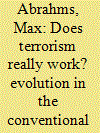

|
|
|
|
|
| Publication |
2011.
|
| Summary/Abstract |
The basic narrative of bargaining theory predicts that, all else equal, anarchy favors concessions to challengers who demonstrate the will and ability to escalate against defenders. For this reason, post-9/11 political science research explained terrorism as rational strategic behavior for non-state challengers to induce government compliance given their constraints. Over the past decade, however, empirical research has consistently found that neither escalating to terrorism nor with terrorism helps non-state actors to achieve their demands. In fact, escalating to terrorism or with terrorism increases the odds that target countries will dig in their political heels, depriving the non-state challengers of their given preferences. These empirical findings across disciplines, methodologies, as well as salient global events raise important research questions, with implications for counterterrorism strategy.
|
|
|
|
|
|
|
|
|
|
|
|
|
|
|
|
| 8 |
ID:
139798
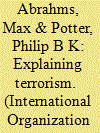

|
|
|
|
|
| Summary/Abstract |
Certain types of militant groups—those suffering from leadership deficits—are more likely to attack civilians. Their leadership deficits exacerbate the principal-agent problem between leaders and foot soldiers, who have stronger incentives to harm civilians. We establish the validity of this proposition with a tripartite research strategy that balances generalizability and identification. First, we demonstrate in a sample of militant organizations operating in the Middle East and North Africa that those lacking centralized leadership are prone to targeting civilians. Second, we show that when the leaderships of militant groups are degraded from drone strikes in the Afghanistan-Pakistan tribal regions, the selectivity of organizational violence plummets. Third, we elucidate the mechanism with a detailed case study of the al-Aqsa Martyrs Brigade, a Palestinian group that turned to terrorism during the Second Intifada because pressure on leadership allowed low-level members to act on their preexisting incentives to attack civilians. These findings indicate that a lack of principal control is an important, underappreciated cause of militant group violence against civilians.
|
|
|
|
|
|
|
|
|
|
|
|
|
|
|
|
| 9 |
ID:
153954
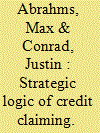

|
|
|
|
|
| Summary/Abstract |
In theory, terrorism is a political communication strategy for groups to convey their grievances and the costs of ignoring them. In practice, though, terrorist groups take responsibility for just a small portion of their attacks. Rather than getting credit for the violence, terrorist leaders generally deny their operatives committed it. This theoretical and empirical disconnect may explain why scholars have ignored the subject of unclaimed attacks despite these being the norm. With a mixed-methods research design, our study helps to fill this lacuna by proposing and testing a new theory to help account for variation in which attacks are claimed.
|
|
|
|
|
|
|
|
|
|
|
|
|
|
|
|
| 10 |
ID:
156616
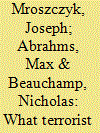

|
|
|
|
|
| Summary/Abstract |
In recent years, a growing body of empirical research suggests that indiscriminate violence against civilian targets tends to carry substantial political risks compared to more selective violence against military targets. To better understand why terrorist groups sometimes attack politically suboptimal targets, scholars are increasingly adopting a principal-agent framework where the leaders of terrorist groups are understood as principals and lower level members as agents. According to this framework, terrorist leaders are thought to behave as essentially rational political actors, whereas lower level members are believed to harbor stronger non-political incentives for harming civilians, often in defiance of leadership preferences. We test this proposition with an original content analysis of terrorist propaganda videos. Consistent with the principal–agent framework, our analysis demonstrates statistically that terrorist leaders tend to favor significantly less indiscriminate violence than their operatives actually commit, providing unprecedented insight into the incentive structure of terrorist leaders relative to the rank-and-file.
|
|
|
|
|
|
|
|
|
|
|
|
|
|
|
|
| 11 |
ID:
080963
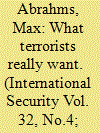

|
|
|
|
|
| Publication |
2008.
|
| Summary/Abstract |
What do terrorists want? No question is more fundamental for devising an effective counterterrorism strategy. The international community cannot expect to make terrorism unprofitable and thus scarce without knowing the incentive structure of its practitioners. The strategic model-the dominant paradigm in terrorism studies-posits that terrorists are political utility maximizers. According to this view, individuals resort to terrorism when the expected political gains minus the expected costs outweigh the net expected benefits of alternative forms of protest. The strategic model has widespread currency in the policy community; extant counterterrorism strategies seek to defeat terrorism by reducing its political utility. The most common strategies are to fight terrorism by decreasing its political benefits via a strict no concessions policy; decreasing its prospective political benefits via appeasement; or decreasing its political benefits relative to nonviolence via democracy promotion. Despite its policy relevance, the strategic model has not been tested. This is the first study to comprehensively assess its empirical validity. The actual record of terrorist behavior does not conform to the strategic model's premise that terrorists are rational actors primarily motivated to achieving political ends. The preponderance of empirical and theoretical evidence is that terrorists are rational people who use terrorism primarily to develop strong affective ties with fellow terrorists. Major revisions in both the dominant paradigm in terrorism studies and the policy community's basic approach to fighting terrorism are consequently in order
|
|
|
|
|
|
|
|
|
|
|
|
|
|
|
|
| 12 |
ID:
078246
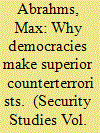

|
|
|
|
|
| Publication |
2007.
|
| Summary/Abstract |
The conventional wisdom is that terrorists tend to target democracies because they are uniquely vulnerable to coercion. Terrorists are able to coerce democracies into acceding to their policy demands because liberal countries suffer from two inherent counterterrorism constraints: (1) the commitment to civil liberties prevents democracies from adopting sufficiently harsh countermeasures to eradicate the terrorism threat, and (2) their low civilian cost tolerance limits their ability to withstand attacks on their civilian populations. This article tests both propositions of the conventional wisdom that (a) terrorists attack democracies over other regime types because (b) liberal constraints render democracies vulnerable to coercion. The data do not sustain either proposition: illiberal countries are the victims of a disproportionate number of terrorist incidents and fatalities, and liberal countries are substantially less likely to make policy concessions to terrorists, particularly on issues of maximal importance. A plausibility probe is then developed to explain why democracies have a superior track record against terrorists. The basic argument is that liberal countries are comparatively resistant to coercion - and hence inferior targets - because they are superior counterterrorists. Liberalism's commitment to civil liberties and low civilian cost tolerance are, in the aggregate, actually strategic assets that help democracies prevail in counterterrorist campaigns, thereby reducing the incentives for terrorists to target this regime type. These findings have important implications for how democracies can defend their liberal values and physical security in the age of terrorism
|
|
|
|
|
|
|
|
|
|
|
|
|
|
|
|
| 13 |
ID:
074629
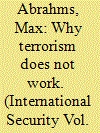

|
|
|
|
|
| Publication |
2006.
|
| Summary/Abstract |
This is the ªrst article to analyze a large sample of terrorist groups in terms of their policy effectiveness. It includes every foreign terrorist organization (FTO) designated by the U.S. Department of State since 2001. The key variable for FTO success is a tactical one: target selection. Terrorist groups whose attacks on civilian targets outnumber attacks on military targets do not tend to achieve their policy objectives, regardless of their nature. Contrary to the prevailing view that terrorism is an effective means of political coercion, the universe of cases suggests that, ªrst, contemporary terrorist groups rarely achieve their policy objectives and, second, the poor success rate is inherent to the tactic of terrorism itself. The bulk of the article develops a theory for why countries are reluctant to make policy concessions when their civilian populations are the primary target.
|
|
|
|
|
|
|
|
|
|
|
|
|
|
|
|
|
|
|
|
|